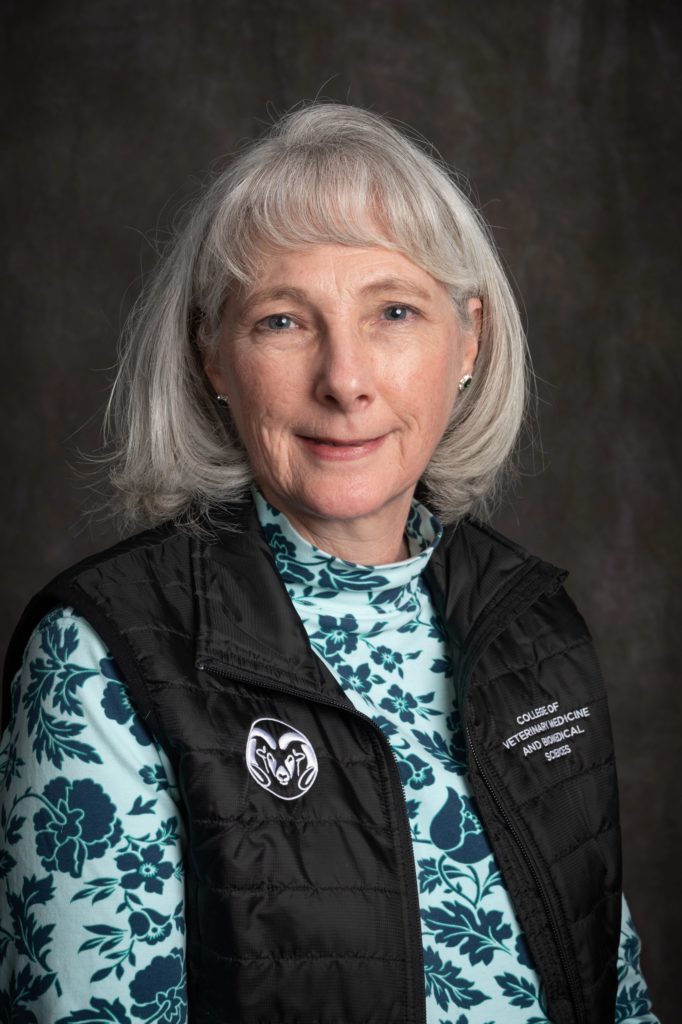
Dawn L. Duval, Ph.D.
Professor and Assistant Department Head for Research
Animals have always been my way of life. I grew up on a 6,500-acre cattle ranch in Northeastern Nevada, where my family ran 700 mama cows. In addition to the cattle, we had horses, sheep, chickens, goats, and of course, cats and dogs.
As a child, I loved helping my mom take care of the baby lambs and calves when the weather turned bad in the spring. Some of my fondest memories are from the kitchen floor where we’d bring the brand new babies inside to keep them safe from the storms.
My family still runs the ranch to this day and visiting home keeps me connected to my early love for animals. My passion for science and research began in the fields around my house, and my dedication to animals flourished in learning to care for them from a young age.
After high school, I earned a bachelor of science in biochemistry with a minor in chemistry from the University of Nevada at Reno. My first taste of research was as an undergrad honors research scholar in the lab of Dr. Ron Pardini. We explored inhibitors of mitochondrial respiration as potential anti-cancer agents. I was hooked from the very beginning – could see such potential in cancer research and I wanted to be a part of the work in finding treatments for people and pets.
After finishing undergrad, I worked as a lab technician in the lab of Dr. Ruth Billings. Working with her solidified my decision to stay in academic research. I went on to complete my PhD in Cell and Molecular Pharmacology and Physiology.
Following my PhD, I finished an F32-supported postdoctoral fellowship with Dr. Colin Clay in physiology at Colorado State University. I then moved to the Endocrine Division at the University of Colorado Health Sciences Center for additional training in Molecular Genetics as a postdoctoral fellow/Instructor/assistant professor in the lab of Arthur Gutierrez-Hartmann. After my fellowship, I joined the faculty of the University of Colorado School of Pharmacy as an assistant professor.
When the Flint Animal Cancer Center began expanding its research program, I came back to Colorado State and opened the Molecular Oncology and Functional Genomics lab. Our work is seeking to define the mechanisms of gene expression, genomics, and biomarker development in canine cancers.
We provide a cell-line validation service for canine and feline cell lines. Current projects explore genetic and gene expression changes contributing to cancer development and metastatic progression in models of hormone-refractory breast cancer, canine osteosarcoma, and bladder cancer.
In the Department of Clinical Sciences, I am also the Assistant Department Head for Research and the Chair of the Clinical Review Board. As the Chair of the Clinical Review Board, I am responsible for assigning clinical trials for review by other members of the committee and handling questions that come up in regard to the administrative review of these trials.
As a professor, I coordinate and teach several classes including cancer biology, a physiology and pathophysiology course, and clinical toxicology. As part of my teaching of clinical toxicology, I maintain the Colorado State University Guide to Poisonous Plants.
In the lab, we are working on many exciting projects. In serving as the co-principal investigator of the Anschutz grant since 2017, I have been given the opportunity to explore the genetic drivers in a variety of companion animal cancers. We are also working with the Biorepository to generate new canine and feline cell lines. We have now developed more than 30 new canine cell lines from a variety of cancers that are now available for use by other Flint Animal Cancer Center Researchers and beyond.
I’m passionate about this work because one of the biggest limitations of improved treatment for cancers is just that we really don’t know enough about them. The decreased cost of sequencing opens the door to exploring a traditionally underfunded area. In the future, we have plans to develop whole-genome libraries that will allow us to identify the critical genetic dependencies of the various cell lines that cause cancer.
When I’m not working, I spend my time with my family and pets. I also love to work in the garden, growing both food and beautiful flowers. When the weather is not conducive for gardening, I sew and quilt.
We have two dogs – Pippin, a Pembroke Welsh Corgi, and Kelly, a chocolate lab. We also have two cats – Isabella and Jiggs. Jiggs came from the family ranch and after many years of living with us, she’s now more of a house cat than a barn cat.
We travel back to my family’s ranch as often as we can. I love seeing our family’s operation and I still have a soft spot for the babies in the spring. Seeing new life reminds me just how important cancer research really is.